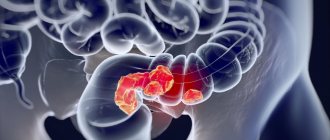Lethargy of the intestinal tract, or, to use the scientific term “atony,” is a weakening or complete disappearance of peristaltic processes caused by the loss of activity of smooth muscle tissue, from which the intestinal structure is built. Periodically contracting, the intestinal muscles move a lump of food debris from the small intestine to the large intestine, thereby ensuring further complete processing of food into nutrients.
For a healthy person, the norm is 16-18 muscle contractions per minute. If the frequency of toning muscle tissue is reduced or completely zero, then we can talk about an ongoing disease. Atony can be either episodic or long-term and cause suffering to the patient for a very long period of time.
And yet, normalizing the functionality of the intestinal tract will not be difficult if the causes that negatively affect the body’s ability to fully digest food are identified in a timely manner. What triggers the occurrence of intestinal atony in a person, how to alleviate the symptoms and what drug treatments exist?
The main factors provoking the occurrence of intestinal atony.
Intestinal atony is a decrease in intestinal peristalsis and loss of tone.
During scientific research in this area of medicine, it was revealed that this disease is most often detected in the population of progressive countries, which for the most part suffers from physical inactivity and whose diet is not sufficiently saturated with unprocessed roughage food and fiber. Also, the trigger mechanism of atony can be:
Lack of physical activity and congestion in the pelvic organs due to a sedentary lifestyle lead to a loss of the frequency of muscle contractions of the intestine and, accordingly, to disruption of the flow of food through the intestines.
- A busy work schedule, constant presence in conflict situations, any excessive load on the nervous system cause a malfunction of all systems in the body, the state of which directly depends on stress factors, this also applies to the intestines.
- Improperly balanced nutrition without the presence in the diet of a sufficient amount of coarse unprocessed food, vegetables, fruits, and cereals. Abuse of sweets and fast food products - all this adversely affects the tone of the intestinal muscles.
- Long-term use of a large number of medications that relieve spasms of smooth muscles, as well as various painkillers.
- Insufficient consumption of lactic acid products and the use of antibiotics disrupt the bacterial balance in the digestive organs, which also contributes to disruption of peristalsis processes.
- Infection of the body with various types of worms, the so-called helminthic infestation. Parasites leave their waste products in the human intestine, which for our body are toxic substances that contribute to the atrophy of the smooth muscles of the intestine.
- Alcohol abuse negatively affects the state of the human central nervous system, which affects the tone of the intestinal muscles. Smoking causes our intestines to work spasmodically - at first the tone rises sharply, and then also rapidly drops and even disappears. Drug addiction to opiate-containing drugs also leads to weakening of the digestive system.
- Cancerous tumor formations in the gastrointestinal tract. When such tumors grow, a huge amount of toxic substances are released into the body. Also, when intestinal tumors grow, they mechanically interfere with the passage of food.
- Atony due to abdominal surgery. Age-related changes in the body, over time all our muscles lose their tone.
- It is important to maintain normal bowel function by caring for your body as a whole. Regular comprehensive preventive examination is necessary, which will help identify the disease in a non-advanced stage, which will greatly facilitate the treatment process.
General information
Intestinal atony is a condition in which a person complains of disturbances in the process of bowel movement.
Such difficulties, first of all, are expressed in the fact that the intervals between acts of defecation are constantly increasing or stool is very difficult. With intestinal atony, a characteristic symptom is constipation , which indicates a number of pathological conditions or is a consequence of the effect of certain negative factors on the human body. Intestinal atony occurs as a consequence of loss of intestinal muscle tone. With intestinal atony, both spasms and noticeable muscle relaxation can be observed. Such problems very often become chronic and continue for the patient for many years.
Symptoms of intestinal atony.
Constipation is the main symptom of intestinal atony.
The main signs that should alert you are:
- Retention of stool for more than two days
- Deterioration in general health
- Severe intestinal colic, increased gas formation
- Inability to concentrate, nervousness, sleep disturbances
- Pale skin, poor condition of hair and nails due to metabolic disorders
- Hardening of feces when they stagnate in the intestines, which can lead to injuries to the intestines and anus.
- If a person does not pay attention to constant defecation problems over a long period of time, then the entire body begins to suffer as a result of the accumulation of toxins in the intestines.
- The process of poisoning of all organs begins, and the temperature begins to rise. Appetite decreases, the sight of food causes rejection. A lack of vitamins immediately affects your appearance, and your resistance to infectious diseases decreases. The most dangerous risk factor is the occurrence of malignant neoplasms.
- If symptoms of intestinal atony are detected, it is very important not to resort to traditional medicine treatment methods, not to abuse self-cleansing of the intestines, but to seek help from doctors.
Symptoms of constipation
The key clinical manifestation of constipation is prolonged retention of bowel movements (absence of stool for more than 48 hours). In addition, there are a number of symptoms that accompany this disorder: • Pain and a feeling of bloating in the intestines. Sometimes slight relief occurs after defecation or passing of gas. • Dense dry feces, traumatic to the anus. Defecation with constipation is often painful. • Lack of sensation of complete bowel movement after defecation, the need for strong pushing. • Blood clots in stool. They can either directly cause defecation disorders or indicate the presence of certain diseases that accompany constipation. Often, blood in the stool appears due to a tear in the mucous membrane of the anal canal due to constipation. • Increased body temperature. This symptom may indicate intoxication. A change in temperature during constipation is an ominous signal about the presence of serious disorders in the body. In addition, constipation is often accompanied by changes in skin tone and elasticity, headaches, sleep disturbances, and general depression. Often the symptomatic picture of constipation is supplemented by flatulence, a feeling of pressure, nausea, belching and bad breath.
Basic methods for diagnosing atony.
For an accurate diagnosis, the doctor prescribes a colonoscopy.
The problems of the gastrointestinal tract are dealt with by specialized specialists: proctologists, gastroenterologists.
The process of diagnosing this functional disorder is a preliminary study of the symptoms from the patient’s words, all the main complaints are carefully listened to, entered into the chart, and only after that the doctor can make a preliminary diagnosis. The next stage is to determine the main factor that led to the onset of the disease.
Complex ways of treating atony.
Metoclopramide is used to prevent gastric stasis.
Cure from intestinal atony occurs with the use of not only medications, but also a whole range of physical exercises; dietary adjustments and lifestyle changes in general are also necessary.
If we talk about medications, then in general the treatment regimen for atony consists of prescribing the following set of medications:
- Mezim, pancreatin and other drugs containing enzymes. Serve to improve food processing by the intestines.
- Anti-flatulence tablets. The most common is Espumisan.
- Antiemetic drugs, possible injection of drugs such as Metoclopramide and its analogues.
- The use of some medications is possible only as prescribed by specialists. These medications include drugs that regulate the activity of the muscular system, normalizing the frequency of intestinal contractions. An example of such a drug is Amiridine.
- It is also possible to use homeopathic medicines, which usually include senna herb.
- Potent medications that affect the normalization of intestinal function and the state of conductivity of the muscular system as a whole are used for treatment only under conditions of hospitalization. Such drugs include Proserin.
Treatment methods also include prescribing a special diet that improves digestion processes.
It is necessary to remember about regular exercise, swimming or any other type of physical activity.
How to balance your diet with intestinal atony.
Beets eliminate toxins in the body.
In case of regular disturbances and malfunctions of the intestines, it is necessary to refrain from eating excessive amounts of foods high in calories, sweets, starchy foods, too soft and viscous foods.
Excessively crushed food mass leads to atrophy of the muscle of the intestinal wall and helps to stop the secretion of enzymes.
You need to diversify your menu with porridges, bran, and wholemeal bread. You need to “train” your intestines by gradually increasing the load on it, that is, gradually accustom the intestines to coarse, raw plant foods, increasing its volume and expanding the range.
Folk remedies for the prevention and treatment of atonic phenomena.
- Honey is a healthy treat and a medicine.
Sunflower oil. It is recommended to drink as a laxative. Castor oil also acts as a laxative; it is best to drink it dissolved in hot coffee or a small amount of cold beer. We should also not forget that if laxatives are taken for a long time, the water-salt balance will be disrupted.
- You can replace the laxative with an evening enema, which is given no earlier than 2 hours after eating. Just wake up on an empty stomach and drink a couple of glasses of cold water with a pinch of table salt. After about an hour, have breakfast. This should be done every day until bowel function normalizes.
- Honey. Dissolve a tablespoon of honey in water at room temperature and drink in the morning before meals. Infusion of dill seeds. Infuse one tablespoon of crushed seeds in 1.5 cups of boiling water (use per day).
- Wheat bran. Pour two heaped tablespoons of wheat bran into a glass of hot milk and leave for 30-40 minutes. Eat half a glass in the morning and evening on an empty stomach for a month.
It is highly not recommended to use traditional methods of treatment without prior consultation with a gastroenterologist.
Atonic constipation during pregnancy
Lazy gut is common in both men and women.
During pregnancy, large amounts of estrogen are produced. It causes relaxation of the intestinal muscles, which leads to atonic constipation. Treatment with laxatives is unacceptable, since they, by increasing intestinal motility, cause contractions of the uterine wall, which can cause miscarriage.
Atonic constipation during pregnancy is not always caused only by hormones; the cause may also be poor nutrition. Then the main treatment will be to adjust the diet. Under no circumstances should you go hungry, nor should you deprive yourself of what you really want. But you can always find a healthier alternative to fried pie or chips. The expectant mother will have to give up buns and chocolate in favor of cereals, fermented milk products, dried fruits and fruit and vegetable salads.
Dishes that increase the release of gases are also undesirable. These include beans, spinach, cabbage. This doesn't mean you can't eat them at all. It is possible, but in limited quantities. It is important for a pregnant woman to drink enough water. Blood volume increases several times. Pregnant women often feel thirsty, but are either afraid to drink a lot because of swelling, or they drink the wrong things: powdered juices, soda, tea, coffee. It is advisable to drink more water and reduce the intake of other liquids. Then swelling will not occur, and constipation will disappear for a long time.
If the diet does not help, the doctor may prescribe drugs that normalize stool, such as Normaze, Prelax and Duphalac, that are safe for mother and child. They promote gentle cleansing of the intestines, normalize microflora, and have virtually no side effects, except increased gas formation. The lactulose contained in these preparations is absolutely harmless to the child. If gases bother a pregnant woman, the doctor may replace the drug with another, for example, Fitomucil. This is a powder containing a large amount of fiber. It is diluted in water and drunk up to three times a day. It's safe and effective. The only inconvenience is that the taste is not the most pleasant.
In emergency cases, when constipation has been going on for several days, you can use glycerin suppositories and disposable microenemas. A pregnant woman should not push too hard so as not to cause uterine tone. You should not use these drugs often, otherwise the intestines will begin to become even more lazy.
Physical activity for intestinal atony.
Abdominal massage will relieve discomfort.
Self-massage helps a lot with discomfort in the intestines.
One of the most common techniques is as follows: after waking up, remain in a lying position, make movements with your right hand without applying strong pressure, first massage the right side of the abdomen from bottom to top to the rib, about 10 times.
After this, massage the left side of the abdomen from top to bottom in the same way with your left hand, at which time the movement of feces through the intestines will begin.
Repeat these movements in turn 3-4 times. The digestive organs can be activated and receive impulses for bowel movements when the abdominal muscles are tense. As an option, you can also do the following exercise in the morning: without getting up after sleep, from a lying position we begin to pump up the abs, without using our hands.
Do 20-30 repetitions at a slow pace. After this, you need to get up, put your hands on your hips and lower yourself to your knees, then rise up about 30 times at a slow pace. Also shown are walks in the fresh air, race walking, and yoga exercises.
General recommendations for symptoms of intestinal atony.
Alcohol harms the gastrointestinal tract.
So, a healthy, active lifestyle, a reasonable approach to nutrition, and the absence of stressful situations will help keep your gastrointestinal tract in perfect condition. Summarizing all of the above, we can highlight the following main points for the prevention of atony:
- Eating foods that promote normal bowel function.
- Development of intestinal and abdominal muscles through gymnastics.
- Quitting smoking and alcoholic beverages.
- For persistent constipation, laxatives and enemas can only be used in consultation with a doctor.
Complications of spastic constipation
Some symptoms of spastic constipation, which has been observed for a long time, are associated with developing complications. Such manifestations include:
- Abdominal pain that does not go away after defecation. Often associated with inflammatory diseases, the development of intestinal diverticulosis, cholecystitis and cholelithiasis, etc.
- Pain in the anus and rectum. They signal about proctitis, paraproctitis, polyps, etc.
- Bloody discharge, mucus in the stool. Such symptoms characterize progressive hemorrhoids, anal fissures and other diseases.
It is worth noting that injury to the intestinal mucosa by solid feces and chronic intoxication can lead to serious complications and increase the risk of colorectal cancer and cardiovascular diseases. Therefore, it is important to get timely help from a doctor.
Get rid of intestinal problems
The natural British drug is not addictive and works immediately
Find Fitomucil with benefits







